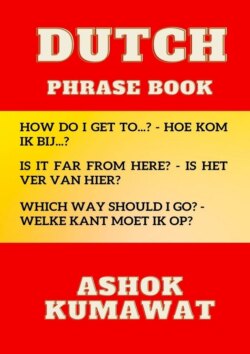Читать книгу Dutch Phrase Book - Ashok Kumawat - Страница 4
На сайте Литреса книга снята с продажи.
Basic Expressions
ОглавлениеIn this chapter, we will explore fundamental Dutch phrases and expressions that are essential for everyday communication. Whether you’re traveling, shopping, or simply engaging in casual conversations, mastering these basic expressions will greatly enhance your ability to interact with Dutch speakers and navigate daily situations with ease.
Yes/No – Ja/Nee
These two words are fundamental to any language. «Ja» means «yes,» and «nee» means «no.» They are used in a variety of contexts, from answering questions to expressing agreement or disagreement.
Please – Alstublieft
«Alstublieft» is a polite way to say «please» when making a request or asking for something. It shows respect and consideration for the other person.
Thank you – Dank u wel
To express gratitude, you can say «Dank u wel.» This phrase is used to say «thank you» in a formal setting or when addressing someone respectfully.
Excuse me – Pardon/Mag ik erlangs?
When you need to get someone’s attention or apologize for a mistake, «Pardon» is commonly used. If you need to pass through a crowded area, you can also say «Mag ik erlangs?» which means «May I pass, please?»
I’m sorry – Het spijt me
When you want to apologize for something, you can use «Het spijt me,» which translates to «I’m sorry.» It’s a sincere way to express regret.
You’re welcome – Graag gedaan
To respond to someone’s gratitude, you can say «Graag gedaan,» which means «You’re welcome.» It conveys a sense of willingness to help.
How much does this cost? – Hoeveel kost dit?
When shopping, you might want to ask about the price of an item. You can use «Hoeveel kost dit?» to inquire about the cost.
Where is…? – Waar is…?
If you’re looking for a specific place or asking for directions, use «Waar is…?» followed by the location you’re searching for.
I don’t understand – Ik begrijp het niet
When you need someone to repeat or explain something, you can say «Ik begrijp het niet,» meaning «I don’t understand.»
Can you help me? – Kunt u mij helpen?
If you need assistance, you can politely ask, «Kunt u mij helpen?» This phrase shows respect and is suitable for formal situations.
I don’t know – Ik weet het niet
When you don’t have an answer to a question or are unsure about something, you can say «Ik weet het niet.»
What time is it? – Hoe laat is het?
To ask about the time, use «Hoe laat is het?»
Can I use the restroom? – Mag ik naar het toilet?
If you need to use the restroom, you can ask «Mag ik naar het toilet?»
I’m lost – Ik ben verdwaald
When you find yourself lost or disoriented, you can say «Ik ben verdwaald» to seek help or directions.
It’s delicious – Het is lekker
To express appreciation for the taste of food or drinks, use «Het is lekker.»
I need a doctor – Ik heb een dokter nodig
In case of a medical emergency, use «Ik heb een dokter nodig» to indicate that you require a doctor’s assistance.
Can I have the check/bill? – Mag ik de rekening?
When you’re done dining at a restaurant and need the bill, you can say «Mag ik de rekening?»
I love it – Ik vind het geweldig
To express your enthusiasm or admiration for something, use «Ik vind het geweldig.»
How do you say… in Dutch? – Hoe zeg je… in het Nederlands?
If you’re trying to learn new vocabulary, you can ask «Hoe zeg je… in het Nederlands?» to inquire how to say a specific word or phrase in Dutch.
Have a nice day! – Een fijne dag!
To wish someone a pleasant day, you can say «Een fijne dag!» This phrase is commonly used when parting ways.
By familiarizing yourself with these basic expressions, you’ll be equipped with the necessary tools to engage in day-to-day conversations, seek assistance when needed, and demonstrate politeness and respect. Practice these phrases regularly, and soon you’ll be conversing comfortably in Dutch.
